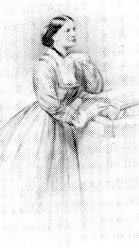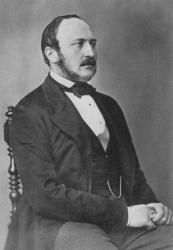Planning worship?
Check out our sister site, ZeteoSearch.org,
for 20+ additional resources related to your search.
- |
User Links
Person Results
Charlotte Alington Barnard

1830 - 1869 Person Name: Charlotte A. Barnard Composer of "BROCKLESBURY" in The Chapel Hymnal Mrs. Charles Barnard, usage: Claribel. See also Claribel, 1830-1869
Charlotte Alington Barnard
I. B. Woodbury
1819 - 1858 Person Name: Isaac B. Woodbury Composer of "TALMAR" in The Voice of Thanksgiving Woodbury, Isaac Baker. (Beverly, Massachusetts, October 23, 1819--October 26, 1858, Columbia, South Carolina). Music editor. As a boy, he studied music in nearby Boston, then spent his nineteenth year in further study in London and Paris.
He taught for six years in Boston, traveling throughout New England with the Bay State Glee Club. He later lived at Bellow Falls, Vermont, where he organized the New Hampshire and Vermont Musical Association. In 1849 he settled in New York City where he directed the music at the Rutgers Street Church until ill-health caused him to resign in 1851. He became editor of the New York Musical Review and made another trip to Europe in 1852 to collect material for the magazine. in the fall of 1858 his health broke down from overwork and he went south hoping to regain his strength, but died three days after reaching Columbia, South Carolina.
He published a number of tune-books, of which the Dulcimer, of New York Collection of Sacred Music, went through a number of editions. His Elements of Musical Composition, 1844, was later issued as the Self-instructor in Musical Composition. He also assisted in the compilation of the Methodist Hymn Book of 1857.
--Leonard Ellinwood, DNAH Archives
I. B. Woodbury
Christian Friedrich Witt
1660 - 1717 Person Name: Christian F. Witt, 1660-1776 Composer of "STUTTGART" in Christian Worship (1993) Christian F. Witt (b. Altenburg, Germany, d. 1660; d. Altenburg, 1716) was an editor and compiler of Psalmodia Sacra (1715); about 100 (of the 774) tunes in that collection are considered to be composed by him, including STUTTGART, which was set to the text "Sollt' es gleich." Witt was chamber organist and later Kapellmeister at the Gotha court. He composed vocal and instrumental music, including some sixty-five cantatas.
Bert Polman
Christian Friedrich Witt
E. H. Thorne
1834 - 1916 Person Name: Edward H. Thorne Composer of "ST. ANDREW " in The Hymnal Thorne, Edward Henry; b. 5-9-1834, Cranbourne, Dorset, d. 12-26-16, London; organist and compos
E. H. Thorne
Margaret Mealy
1922 - 2020 Person Name: Margaret W. Mealy, b. 1922 Harmonizer of "RESTORATION" in The Hymnal 1982
Margaret Mealy
W. S. Rockstro
1823 - 1895 Arranger of "OMNI DIE" in Songs of Praise William Rockstro (Composer, Arranger)
Born: January 5, 1823 - North Cheam, Surrey (baptisized at Modern Church), England
Died: July 2, 1895 - London, England
The English composer and writer on music, William Smith [Smyth] Rockstro (originally: Rackstraw), was distinguished as a student of modal music and an important contributor to the Grove’s Dictionary of Music and Musicians. The form of his surname by which he was known was an older style resumed after 1846. He was successively pupil of John Purkis, the blind organist, of Sterndale Bennett, and at the Leipzig Conservatorium, where he studied from I845 to 1846. He enjoyed the special friendship and tuition of Felix Mendelssohn, and was with Moritz Hauptmann for theory and with Plaidy for pianoforte.
For some years after his return to England, William Rockstro was active as a teacher and performer in London, being regular accompanist at the 'Wednesday concerts,' where Braham and other eminent singers were to be heard. At this period he wrote his most popular and beautiful song, Queen and huntress; and his pianoforte editions of classical and other operas led the way in popularising that class of music in an available form for the use of those who could not read full scores; and in his indications of the orchestral instruments above the music-staves he did much to point the way towards a general appreciation of orchestral colour. In the early 1860's he left London for Torquay on account of his mother's health and his own, and on her death in 1876 he became a Roman Catholic.
William Rockstro had been organist and honorary precentor at All Saints' Church, Babbacombe, from 1867, and won a high position as a teacher. Re published, with T. F. Ravenshaw, a Festival Psalter, adapted to the Gregorian Tones, in 1863, and Accompanying Harmonies to the Ferial Psalter in 1869. These were the first fruits of his assiduous study of ancient music, on which he became the first authority of his time in England. A couple of textbooks on harmony (1881) and counterpoint (1882) had a great success, and in the latter part of the first edition of the Grove’s Dictionary of Music and Musicians he wrote a large number of articles on musical archaeology generally. Later research has superseded his, but at the time he wrote, his contributions to such subjects as the music of the period which closed in 1600 were important. He was too ardent a partisan to be an ideal historian, but his History of Music for Young Students (1879) and his larger work, A General History of Music (1886), contain much that is of permanent value. His Life of Handel (1883) and Mendelssohn (1884) are fine examples of eulogistic biography, though they are hardly to be recommended as embodying a calmly critical estimate of either composer. In his larger History he showed that he was, nevertheless, not above owning himself in the wrong, and his recantation of certain excessive opinions expressed by him in the Dictionary against Wagner's later works was due to true moral courage. He conducted a concert of sacred music of the 16th and 17th centuries at the Inventions Exhibition of 1885, and in 1891 gave up Torquay for London, giving lectures at the Royal Academy of Music and Royal College of Music, and holding a class to counterpoint and plain-song at the latter institution. As a singing-master and teacher of the pianoforte his method of imparting instruction was remarkably successful.
As a composer, William Rockstro never quite freed himself from the powerful influences engendered by his studies: the lovely madrigal, "O too cruel fair," was judged unworthy of a prize by the Madrigal Society on the ground that it was modelled too closely on Giovanni Pierluigi da Palestrina; and his oratorio, The Good Shepherd, produced at the Gloucester Festival of 1886 under his own direction, was found to bear too many traces of Mendelssohnian influence to deserve success. In 1891 he collaborated with Canon Scott Holland in writing the life of his old friend, Jenny Lind-Goldschmidt; an abbreviated edition came out in 1863, and with Otto Goldschmidt he wrote still a shorter book, Jenny Lind, her Vocal Art and Culture (partly reprinted from the biography). For many years his health had been bad, and he had many adverse circumstances to contend with. He fought bravely for all that he held best in art, and boundless enthusiasm carried him through.
Source: Grove’s Dictionary of Music and Musicians (1952 Edition; Author: J.A. Fuller Maitland; revised: H.C. Colles)
Contributed by Aryeh Oron (July 2007)
--www.bach-cantatas.com/Lib/
W. S. Rockstro
Edmund S. Carter
1845 - 1923 Person Name: E. S. Carter Composer of "CARTER" in The School Hymnary Born: February 3, 1845, New Malton, Yorkshire, England.
Died: May 23, 1923, Scarborough, Yorkshire, England.
Carter attended Worcester College, Oxford (BA & MA 1871). He was ordained deacon in 1871, and priest in 1872. He served as Curate of Christ Church, Ealing, Middlesex (1871-75); Vicar choral of York Minster (1875); Rector of St. Martin, Micklegate, York (1877-82); and Vicar of St. Michael Belfry, York (1882).
Music:
DAY BY DAY
WREFORD
--www.hymntime.com/tch/
Edmund S. Carter
Darius E. Jones
1815 - 1881 Composer of "STOCKWELL" in Hymnal of the First General Missionary Convention of the Methodist Episcopal Church, Cleveland, Ohio, October 21 to 24, 1902.
Darius E. Jones
Albert, Prince Consort

1819 - 1861 Person Name: H. R. H. the Prince Consort, 1819-1861 Composer of "GOTHA" in Church Hymns Albert, Prince of Saxe-Coburg-Gotha, Prince Consort of Great Britain born at Castle Rosenau, near Coburg, Aug. 26, 1819, died at Windsor Castle, Dec 14, 1861. Pianist, studied music at Coburg and at Brussels. Works: Masses; Anthems; Songs and glees; also an opera, Hedwig von Linden.
Cyclopedia of Music and Musicians by John Denison Camplin, Jr. and William Foster Apthorp (Charles Scribner’s Sons, 1888)
Albert, Prince Consort
Daniel Hughes
Person Name: D. H. Translator of "Geilw'r Iesu uwch alfonydd (Jesus calls us o'er the tumult)" in Mawl a chân = praise and song
Daniel Hughes


 My Starred Hymns
My Starred Hymns


